 16 citations,
May 2017 in “American Journal of Clinical Dermatology”
16 citations,
May 2017 in “American Journal of Clinical Dermatology” The document concludes that more research is needed to understand and treat Beard Alopecia Areata due to limited current knowledge and evidence.
 4 citations,
February 2020 in “Journal of Cosmetic Dermatology”
4 citations,
February 2020 in “Journal of Cosmetic Dermatology” Trichoscopy helps diagnose hairline recession causes in Egyptian women, with androgenetic alopecia being the most common.
 2 citations,
January 2017 in “Przegla̧d dermatologiczny”
2 citations,
January 2017 in “Przegla̧d dermatologiczny” Two trichoscopic patterns found in hair loss: diffuse fibrotic and androgenetic alopecia, affecting treatment choice and regrowth chances.
 31 citations,
September 2014 in “International Journal of Dermatology”
31 citations,
September 2014 in “International Journal of Dermatology” Anthralin is effective for psoriasis and alopecia with minimal systemic side effects but can irritate the skin.
 53 citations,
August 2019 in “American journal of human genetics”
53 citations,
August 2019 in “American journal of human genetics” FOXN1 gene variants cause low T cells and immune issues from birth.
 35 citations,
January 2013 in “Indian Journal of Dermatology, Venereology and Leprology”
35 citations,
January 2013 in “Indian Journal of Dermatology, Venereology and Leprology” Intralesional triamcinolone acetonide is effective for treating patchy hair loss, and dermoscopy helps detect treatment response and side effects early.
 2 citations,
August 2010 in “Journal of the American Academy of Dermatology”
2 citations,
August 2010 in “Journal of the American Academy of Dermatology” A 65-year-old woman has a growing bald spot on her scalp.
 January 2023 in “Bio web of conferences/BIO web of conferences”
January 2023 in “Bio web of conferences/BIO web of conferences” The document concludes that specific dermoscopic features can help diagnose different facial red skin conditions.
 39 citations,
December 2008 in “Clinics in Dermatology”
39 citations,
December 2008 in “Clinics in Dermatology” Dermoscopy has improved skin cancer diagnosis and has expanding applications in dermatology, but requires staying updated with new research and techniques.
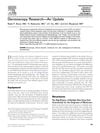 30 citations,
September 2009 in “Seminars in Cutaneous Medicine and Surgery”
30 citations,
September 2009 in “Seminars in Cutaneous Medicine and Surgery” Dermoscopy has greatly improved the diagnosis of skin lesions and our understanding of their morphology and biology.
 17 citations,
January 2010 in “Acta Dermato Venereologica”
17 citations,
January 2010 in “Acta Dermato Venereologica” EGFR inhibitors can cause yellowish skin eruptions.
 10 citations,
June 2020 in “Journal of Cosmetic Dermatology”
10 citations,
June 2020 in “Journal of Cosmetic Dermatology” Frontal fibrosing alopecia may be linked to genital Lichen sclerosus through an autoimmune process.
76 citations,
January 2011 in “Indian Journal of Dermatology/Indian journal of dermatology” Dermoscopy is a useful tool for diagnosing and managing alopecia areata.
 8 citations,
January 2020 in “International Journal of Trichology”
8 citations,
January 2020 in “International Journal of Trichology” Different patterns on the scalp help diagnose types of hair loss without needing a biopsy.
 8 citations,
August 2016 in “Acta dermato-venereologica”
8 citations,
August 2016 in “Acta dermato-venereologica” Timolol eye-drops can cause hair loss.
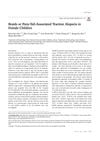 4 citations,
January 2019 in “Annals of dermatology/Annals of Dermatology”
4 citations,
January 2019 in “Annals of dermatology/Annals of Dermatology” Changing hairstyles can help hair regrow in children with hair loss from tight braids or ponytails.
 August 2023 in “International journal of research in dermatology”
August 2023 in “International journal of research in dermatology” Janus kinase inhibitors are effective and generally safe for treating hair loss in adults with alopecia areata.
 December 2007 in “CRC Press eBooks”
December 2007 in “CRC Press eBooks” Alopecia areata incognita causes widespread hair loss without patches and needs a scalp biopsy for diagnosis.
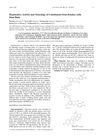 58 citations,
January 2003 in “Biological & Pharmaceutical Bulletin”
58 citations,
January 2003 in “Biological & Pharmaceutical Bulletin” Bombax ceiba stem bark extracts can lower blood pressure, but high doses can be toxic and lethal.
 52 citations,
April 2013 in “Developmental Cell”
52 citations,
April 2013 in “Developmental Cell” Brg1 is crucial for hair growth and skin repair by maintaining stem cells and promoting regeneration.
 26 citations,
August 2013 in “Australasian Journal of Dermatology”
26 citations,
August 2013 in “Australasian Journal of Dermatology” Certain scalp patterns can indicate the severity and activity of hair loss in Turkish alopecia patients.
 16 citations,
July 2016 in “Veterinary Dermatology”
16 citations,
July 2016 in “Veterinary Dermatology” Dermoscopy is useful for diagnosing hair loss patterns in dogs.
 15 citations,
October 2020 in “Journal of Investigative Dermatology Symposium Proceedings”
15 citations,
October 2020 in “Journal of Investigative Dermatology Symposium Proceedings” Platelet-Rich Plasma (PRP) could potentially help regrow hair in people with Alopecia Areata, but more research is needed to confirm its effectiveness.
 10 citations,
January 2022 in “Scholars international journal of anatomy and physiology”
10 citations,
January 2022 in “Scholars international journal of anatomy and physiology” Aloe Vera gel helps heal skin, treats skin conditions, and can stimulate hair growth due to its various healing properties.
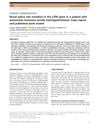 9 citations,
February 2018 in “The Journal of Dermatology”
9 citations,
February 2018 in “The Journal of Dermatology” A new mutation in the LIPH gene was found to cause a rare hair disorder in a Japanese boy.
 7 citations,
January 2009 in “International Journal of Trichology”
7 citations,
January 2009 in “International Journal of Trichology” Dermoscopy can't help doctors identify scalp irritation caused by topical minoxidil.
 1 citations,
July 2018 in “Elsevier eBooks”
1 citations,
July 2018 in “Elsevier eBooks” Alopecia Areata is an autoimmune hair loss condition, with various treatments showing mixed effectiveness and no guaranteed cure.
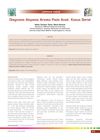 April 2022 in “Cermin Dunia Kedokteran”
April 2022 in “Cermin Dunia Kedokteran” Accurate diagnosis and understanding of alopecia areata in children are crucial for proper treatment.
 November 2017 in “Pediatrics in Review”
November 2017 in “Pediatrics in Review” A 4-year-old girl with hair loss was diagnosed with early-onset trichotillomania and improved with behavioral interventions.

Dermoscopy is useful for diagnosing hair loss patterns in dogs.





























